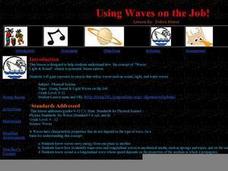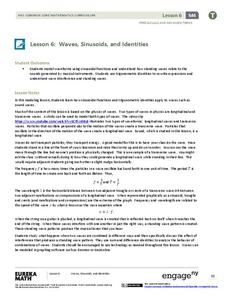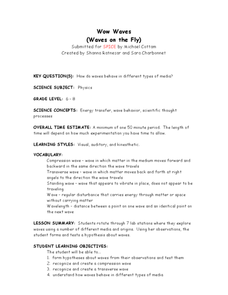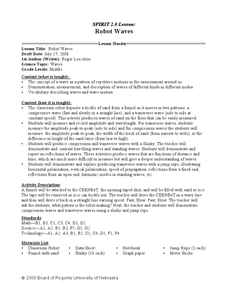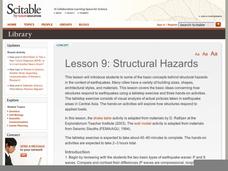Acoustical Society of America
Anatomy of a Wave
Pair physical science learners up, and have one describe a transverse wave while the other blindly attempts to draw it. Then reveal an actual diagram and explain the different parts of the wave: crest, trough, wavelength. Though most of...
Curated OER
Using Waves on the Job!
A colorful and comprehensive PowerPoint highlights this lesson on waves. Junior geophysicists pretend that they are hired to analyze seismic waves. A worksheet is provided to go along with an online article about how compact discs work...
Curated OER
Waves
Light waves and sound waves are the focus of this science lesson designed for 5th graders. Besides discovering how these waves travel, learners also discover the basic properties of waves, and analyze data tables and graphs. The...
National Nanotechnology Infrastructure Network
Understanding Wave Motion - Slinky vs. Snaky: Which Spring is Dominant?
Ride the wave to an understanding of refraction! The first in a series of two inquiry-based lessons challenges learners to create transverse waves with two different types of springs. As their wave hits an object, they observe the change...
Cornell University
Sound Waves
How does sound travel through different mediums? Scholars explore this question by creating and observing sound waves as they learn the difference between transverse and longitudinal wave motion. Using their new knowledge, class members...
EngageNY
Waves, Sinusoids, and Identities
What is the net effect when two waves interfere with each other? The lesson plan answers this question by helping the class visualize waves through graphing. Pupils graph individual waves and determine the effect of the interference...
California Department of Education
What Is a "Wave"?
Take a stretch, but don't wave goodbye. An interesting resource provides everything needed to present an introductory lesson plan on waves. Teachers present a PowerPoint defining the types of waves and their characteristics. Pupils use a...
Acoustical Society of America
Wave Basics
Catch the fast wave. Using a computer simulation, pupils experiment with amplitude, frequency, damping, and tension of a string to determine which affects the speed of the wave. Learners record the observations to determine their...
Curated OER
Let's Do the Wave!
Young scholars distinguish waves from matter, differentiate between transverse and longitudinal waves, use sine curves as representations of transverse waves, label characteristic properties of waves, diagram transverse waves having...
Curated OER
Wow Waves (Waves on the Fly)
Students formulate hypotheses on wave behavior and test them. In this physics lesson plan, students compare and contrast transverse and compression waves. They determine the wavelength of transverse waves.
Curated OER
Wave Motion
Students observe and identify various waves. In this wave motion lesson, student use a Slinky, noise, people, and musical instruments to create waves and observe how each type of wave moves.
Curated OER
Riding the Radio Waves
Students examine the basic concepts of radio waves and magnetic fields. They study how the AM radios are built and demonstrate the concepts of amplitude and frequency.
Curated OER
Surfs up!
Students learn about longitudinal and transverse waves. In this waves lesson plan, students learn the characteristics of longitudinal and transverse waves by observing demonstrations. They then categories each wave as longitudinal or...
Curated OER
Transverse Wave Demonstrator
Students discover the properties of waves in Chemistry and Physics. In groups, they develop and build their own device to demonstrate transverse waves. They complete their tests, record the results and discuss the conclusions with the...
Curated OER
Applied Science - Physics (5A) Pre Lab
Fifth graders look at different types of waves. In this wave instructional activity, 5th graders find the difference and similarities of electromagnetic and physical waves. They review the components of waves such as crest, trough,...
Curated OER
Robot Waves
Students differentiate the properties of longitudinal and transverse waves. In this physics lesson, students calculate CEENBoT's rate of propagation by measuring its frequency and distance per cycle. They use a mathematical formula...
Curated OER
Waves
Students identify the different parts of a wave. In this physics lesson, students explain how animals communicate using sound waves. They discuss the effect of Navy's sonar on dolphins and whales.
Curated OER
Wave Properties
Learners identify how waves transfer energy without transferring matter. They contrast transverse and compressional waves and relate wave speed, wavelength, amplitude and frequency. Lesson includes PowerPoint presentation.
Curated OER
Make Waves
Sixth graders discover, through exploration, the basic characteristics of waves. After a lecture/demo, 6th graders work in groups and participate in a series of labs where they investigate waves. Each group presents its findings to the...
Nature
Structural Hazards
The scientific explanation of seismic waves is detailed in the introduction. A fictional scenario is also provided for your class to discuss. Pictures and handouts that are meant to be included, however, they are not accessible....
Curated OER
Checking the Surf
Students read and discuss waves and their wavelengths and amplitudes. In this waves lesson plan, students draw the wavelength and amplitude of a wave and discuss tsunamis and storms.
Curated OER
Light
Light is such a fascinating subject. This lesson does a great job of illuminating the mysteries of light for your young scientists. A series of demonstrations which are explained in the plan should help your charges to understand how...
Curated OER
Differential Thermal Calorimetry
Young scholars access prior knowledge of infrared rays, ultraviolet rays, gamma rays, x-rays and cosmic waves. In this electromagnetic waves lesson, students hold a mock trial electromagnetic spectrum. Young scholars present...
Curated OER
Earthquake Waves And Their Destructions
Students investigate primary and secondary waves and how to measure the magnitude of waves. They discover how to find the epicenter of earthquakes. They examine why waves are more destructive in some areas than others through these...
Other popular searches
- Transverse Wave Label
- Transverse Waves Slinky
- Transverse Waves Physics
- Waves Transverse Longitudinal

